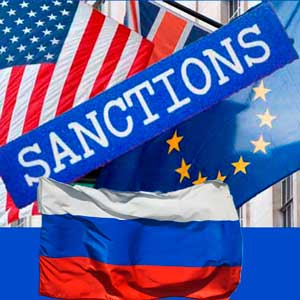The United States imposed sanctions against seven Russians and a ceramics store
The United States imposed sanctions against seven Russians and one company, according to the website of the Office for Foreign Assets Control of the US Department of the Treasury.
They were included in the SDN (Specially Designated Nationals and Blocked Persons) sanctions list. US citizens and legal entities are prohibited from doing business with persons and organizations that fall into it .
The following were sanctioned:
Svetlana Boyko from St. Petersburg, born in 1990; Vasily Gromovikov (aka Zevsgod2000) from St. Petersburg, born in 1993; Gleb Khloponin from Zheleznodorozhny near Moscow, born in 1985; Alexey Losev (aka Perko) from Kaluga, born in 1986; Yuri Makolov from St. Petersburg/Tolyatti, born in 1995; Konstantin Sapozhnikov from St. Petersburg; Anna Travnikova (aka Anna Tausent) from Kaluga, born in 1990.Perko Julleuchter, a Kaluga-based company that manufactures porcelain and ceramics and is linked to Losev, also fell under the sanctions. The company's website on VKontakte says that this is a family ceramics workshop that produces Yule lamps (a ceramic turret about 20 cm high for lighting candles).
The US Treasury believes that these citizens are associated with anti-government protests that took place in Moldova in February and March. The demonstrators demanded the resignation of incumbent President Maia Sandu.
Read PionerProdukt .by How to avoid a career crash when everything is unstable - four skills in Abu Dhabi as an alternative to Dubai: what an investor needs to knowAccording to OFAC, the sanctioned Russians were involved in "a conspiracy to capitalize on these protests and seize the Government House of Moldova." According to the department, Sapozhnikov was the leader of the group, Makolov was in charge of logistics, Khloponin "participated in collecting information on the security of various government buildings in Moldova", Boyko is "a high-ranking member of this influence group and was involved in the budgeting of the conspiracy", Losev "led intelligence in Moldova on the subject of a conspiracy to destabilize the government", Gromovikov "is involved in financing the conspiracy", and Travnikova "participated in the operations of an influence group in order to sway public opinion abroad in favor of Russia in the context" of the conflict in Ukraine. In 2022, Travnikova coordinated with Boyko to promote pro-Russian narratives to audiences in many countries, including the United States. All assets of these persons that are in the United States or under the control of American persons are blocked.
RBC sent a request to the Information and Press Department of the Russian Foreign Ministry.
Protests took place in Chisinau and other cities of Moldova in February and March. They were organized with the participation of the opposition Shor party. The protesters demanded that the authorities pay their utility bills and called on the government to resign. There were clashes between security forces and protesters.
During protests in March, Moldovan police detained seven people. Then it was reported that they had uncovered a network of agents whose activities were aimed at destabilizing the country. According to Viorel Cernautanu, head of the General Police Commissariat, members of this network came from Russia to Moldova "with a very specific purpose" and wanted to "weaken the local pro-Western government." In April, a court in Moldova sentenced businessman Ilan Shor, leader of the Shor Party, in absentia to 15 years in prison.
The Russian authorities have repeatedly stressed that the country does not interfere in the affairs of other countries. The accusations that Moscow is trying to destabilize the situation in Moldova were called unfounded and unsubstantiated by the Russian Foreign Ministry. According to the department, this “disinformation” was launched in Moldova at the initiative of the Ukrainian authorities, and “the true goal of Kyiv is to draw Chisinau into a tough confrontation with Russia.” In addition, the Moldovan authorities want to divert the attention of residents from internal problems with the “myth of the Russian threat,” the ministry added.





























































